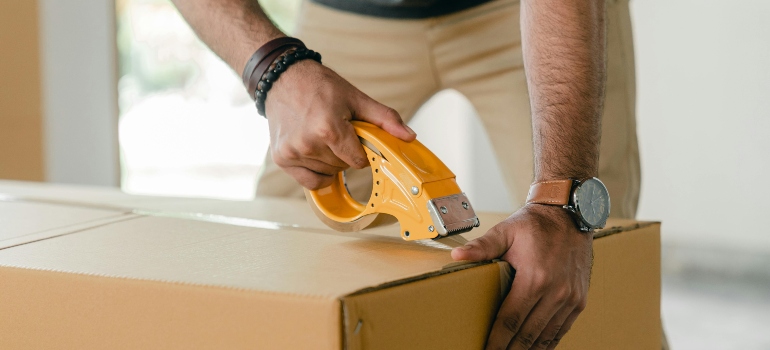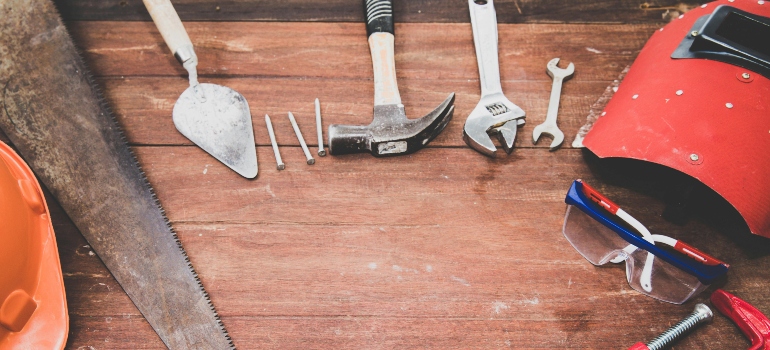Tips and Tricks for Relocating a Workshop
When relocating a workshop, meticulous planning and efficient execution are key to ensuring a worry-free relocation. Whether moving to a new city or simply upgrading to a larger space, the process can be daunting without the right guidance. That’s where Best Cross Country Movers comes in. As a trusted platform for suggesting movers, we understand the challenges that come with relocating a workshop. We are also here to provide expert advice. Here, we’ll share invaluable tips and tricks to help you navigate every aspect of the relocation process with ease. From planning and packing to setting up your new space, you’ll find everything you need to make your workshop relocation a success!
Planning Your Workshop Relocation
Relocating a workshop successfully is not possible without a good plan and organization. Moving your workshop is a great opportunity to improve its quality in your new location. Try to make a plan no matter what kind of workshop you’re relocating. Firstly, write down all inventory from the workshop and make three columns. In each, list the items you need to relocate: large, heavy, and small items. This inventory will serve as the foundation for your relocation strategy. Also, organize buying packing supplies.

Finding a reliable moving company is also crucial. Look for experienced cross country moving companies that specialize in workshop relocations. Their expertise will ensure your equipment is handled safely and efficiently. Pick the best time to relocate to avoid weather-related damage. Tools and equipment left outdoors in snowy or rainy conditions can be damaged. Trusting professionals like long distance moving companies Florida can help you relocate your workshop easily to your new location.
Organizing and Decluttering
Workshops and garages are often full of cluttered messes. When moving, every dollar matters. Since movers charge by the hour, but also by the weight of the shipment, try to save money by decluttering your workshop. Get rid of old and damaged things. Other things, if they are in good condition but you don’t need them anymore, can be sold or donated. There are always some risks of relocating your business. Make sure you stick to your moving plan.
- Sort tools and materials. Begin by categorizing your tools and materials into piles based on their condition and necessity. Separate items into those you will keep, sell, donate, or dispose of.
- Prioritize essential items. Identify the tools and materials essential for your workshop’s operations and prioritize their relocation. This will help minimize unnecessary items being moved, reducing costs and simplifying the packing process.
- Dispose of unusable items. Dispose of any damaged or unusable tools and materials that are beyond repair. This will not only lighten the load for the move but also prevent clutter in your new workshop space.
- Sell or donate unused items. Consider selling or donating items in good condition that you no longer need. This can help recoup some moving costs and benefit others in need.
- Review and adjust the moving plan. Regularly review your moving plan to ensure you’re on track and adjust as needed to mitigate any potential risks or challenges that may arise during the relocation process.

Packing Strategies for Tools and Equipment
Before you start relocating a workshop, gather all the packing materials and supplies you need. These things depend on the type of workshop. For example, you will need different packing supplies for moving an art workshop and a garage workshop. Let’s see what an average workshop requires for packing:
- Plastic containers. Use sturdy plastic containers to store smaller tools and accessories. Ensure they are protected during transit.
- Food containers and plastic jars. Repurpose food containers and plastic jars to store smaller items like screws, nails, and bolts, keeping them organized and secure.
- Plastic zip lock bags. Utilize plastic zip-lock bags to store small parts or items that need to be kept together. Prevent them from getting lost during the move.
- Garbage bags. Use heavy-duty garbage bags to protect larger items from dust and dirt during transit, especially for items that may not fit into containers or boxes.
- Moving Boxes. Invest in durable moving boxes of various sizes to accommodate different tools and equipment. Use smaller boxes for heavier items to prevent overpacking.
- Packing paper and tape. Wrap fragile tools and equipment in packing paper and secure them with tape to prevent damage during transport.
- Ropes and old clothes. Use ropes and old clothes to cushion and secure larger tools and equipment within boxes or containers.
- Sticker labels or markers. Label boxes and containers with sticker labels or markers to easily identify their contents and ensure they are handled with care.
- Large heavy-duty trash cans. For larger tools or equipment, consider using heavy-duty trash cans with lids for added protection and ease of transport.
If you’re relocating your workshop to your new house, check improvised in-house storage ideas and consider budget-friendly renovation options to optimize your new workshop space.
Managing Inventory During the Move
Effective management of inventory is crucial during a workshop relocation, particularly when entrusting the process to interstate movers Georgia. To maintain control and accountability over your tools and equipment, implementing strategic tracking methods is essential. Start by labeling boxes and containers with detailed descriptions of their contents, including the type of tools and any special considerations for fragile items.

Also, create a comprehensive inventory list that documents each item being moved, along with its corresponding box or container number. This list serves as a reference point throughout the relocation process, allowing you to easily track the whereabouts of your inventory and ensure that nothing is misplaced or overlooked. Regularly update the inventory list as items are packed, loaded onto the moving truck, and unloaded at the new location.
Streamlining Communication and Coordination
Effective communication and coordination are paramount when working with interstate movers Montana during a workshop relocation. Clear and concise communication ensures that everyone involved in the process understands their roles and responsibilities, minimizing the risk of misunderstandings or errors. By maintaining open lines of communication with your team members or movers, you can address any concerns or questions that may arise, facilitating a smoother and more efficient relocation experience. Regular updates and progress reports help keep everyone informed of the status of the move, allowing for adjustments to be made as needed.
Coordinating schedules and logistics also ensures that tasks are completed on time and that all necessary preparations are made before the moving day. By fostering a collaborative environment through effective communication and coordination, you can optimize the relocation process and achieve your desired outcomes with the assistance of professional movers.
Setting Up Your New Workshop
When relocating a workshop, it’s crucial to think through each step of setting up in a new space. This involves more than just moving your equipment. It requires strategic planning to ensure everything from tools to utilities is perfectly arranged for maximum efficiency and ease of use.
Efficient organization of tools and equipment
Once you decide what to bring to your new workshop, start by thoroughly cleaning your tools and equipment. Before packing, wipe down each item to remove any dirt, dust, or residues. This not only keeps your moving boxes clean but also ensures you start fresh in your new space. Utilize towels, old clothes, or damp rags to effectively clean off any dust, dried mud, dirt, sawdust, oil spills, as well as any pests or spider eggs that might have lodged in stored tools. Since tools that haven’t been used for a while may harbor bugs and spiders, wearing gloves during this process is a smart precaution.

Optimizing your workshop layout
After relocating your clean and organized tools with the help of cross country movers Texas, focus on optimizing the layout of your new workshop. Consider the workflow and how you move around while working. Arrange your equipment and tools in a way that minimizes unnecessary movement and enhances accessibility. This might involve placing frequently used tools within easy reach and storing heavier equipment in a stable, accessible spot. Also, think about the installation of necessary utilities like electrical outlets, lighting, and ventilation systems. Proper placement of these utilities is vital for creating a safe and productive working environment. By thoughtfully arranging your space, you’ll create an efficient workshop that supports your projects and creativity.
Addressing Safety Concerns in Workshop Relocation
Safety must be a top priority when relocating a workshop, especially when dealing with heavy machinery and hazardous materials. Before you begin the move, familiarize yourself with items that are prohibited on moving trucks to avoid any surprises. For instance, while oil-based paints can be moved because they are hazardous, they must be taken to a recycling center, not included with your other moving items. Other common prohibited items include gasoline, kerosene, motor oil, acetone, paint thinner, and bleach.

When moving heavy equipment, a clean and debris-free floor is crucial to prevent accidents. It’s advisable to enlist the assistance of friends or family members, as handling bulky items alone can be risky. Disconnect all cables and wires, and ensure devices are unplugged before attempting to move them. Use professional moving equipment such as forklift jacks, dollies, straps, chains, and crowbars to safely transport these items. This approach minimizes the risk of injury and damage to your valuable equipment. For optimal safety and efficiency, consider hiring interstate movers Los Angeles, who specialize in safely relocating workshops. Their expertise and access to the right tools can make a significant difference in ensuring a smooth and secure transition to your new workshop location.
Adapting to Changes in Your New Workshop
Adapting to a new workshop layout or changes in workflow can be challenging, but with a few strategic approaches, you can easily maximize your new space’s potential. Initially, take the time to assess the setup of your new workshop. Identify any differences in space, layout, or available facilities compared to your old setup. This will help you pinpoint necessary adjustments, such as reconfiguring tool placement or modifying your workflow to better suit the new environment. It’s also beneficial to temporarily implement flexible storage solutions, allowing you to experiment with different configurations without committing to permanent changes.
Furthermore, be open to trial and error as you settle into your new workshop. It’s natural to face some challenges during this adjustment period. To effectively overcome these, maintain a problem-solving attitude and be willing to adapt your methods or the physical setup as needed. This might involve investing in additional storage units, upgrading equipment, or even rearranging your workspace multiple times until you find the most efficient layout. If the task seems daunting, remember that cross country movers Newark can offer services and advice on the best practices for relocating and setting up workshops.
Enlisting Professional Help for an Easy Workshop Relocation
When relocating a workshop, there are instances where the do-it-yourself approach might not be the best choice, especially when handling heavy or high-value items. Below are some tips on when to consider professional help and how to find reputable services that fit your budget.
Using storage solutions for prohibited items
Since certain items like chemicals and large equipment are prohibited on moving trucks, consider using storage solutions for temporary or long-term needs. Storage facilities offer a secure and flexible option for items that cannot be immediately relocated to your new workshop. They come in various sizes and can accommodate a wide range of workshop items, from smaller tools to larger machines. Utilizing storage allows you to move these items at your own pace and ensures that they are kept safe until you’re ready to integrate them into your new space.
Hiring professional movers for heavy and valuable items
If your workshop includes heavy machinery or valuable tools, hiring professional movers is a wise decision. Professional movers have the expertise and equipment to handle heavy items safely. This minimizes the risk of injury and damage during the move. Although their services might come at a higher cost, the peace of mind and security they provide are well worth the investment. To further protect your assets, consider opting for moving insurance. This is especially crucial if your workshop contains expensive equipment.

Mastering Your Workshop Move
Successfully relocating a workshop is a complex task that requires attention to detail and careful planning. By inventorying your tools, cleaning and packing them properly, and carefully organizing the move, you can ensure a smooth transition to your new space. Hiring professional help, such as interstate movers Boston, can greatly facilitate the transportation of heavy and valuable equipment, significantly reducing the risk of damage and injury. Remember to be patient and flexible as you adjust to the new layout and workflow in your relocated workshop. With these tips and tricks, you can look forward to a more organized, efficient, and productive workspace in your new location!





